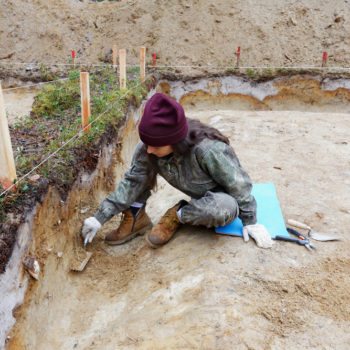Why We Love It
-
$61,120Potential Avg. Salary*
* Salary & growth data is based on the recent Bureau of Labor and Statistics data published at https://www.bls.gov/oes/current/oes193093.htm for 19-3093 Historians 11/2021. Based on national data, not school-specific information. Conditions in your area may vary.
In a bachelor of science in history program, students study the history of world civilizations through analysis of historical artifacts, texts, literature, and recordings.
Students may focus on historical knowledge and thought comprehensively—studying all history broadly for all regions and civilizations—or may focus on a particular aspect of history, such as European, Egyptian, American, or Asian history.
What is a Degree in History?
Majoring in history as an undergraduate allows students to focus their educations on gaining a thorough knowledge of the history of the world and its civilizations. Some programs provide a broad overview of all historical knowledge, while others focus on a specific set of history or a specific civilization.
Commonly, students study history as part of an education degree to teach in elementary, middle, or high schools after graduation, but there are many other possible careers as well.
Many history graduates find work with museums, galleries, and historical societies, helping others understand the meaning and use of historical artifacts. Some history majors pursue graduate degrees and find work as college history professors, archaeologists, or authors of historical subject matter.
A major in history is also considered one of the preferred undergraduate majors for aspiring law school students, and many lawyers and judges started their educational and political careers as history majors.
Recommended Schools
What Courses Would I Take For a Major in History?
- Ancient Greece
- Roman World
- Medieval Europe
- Early Modern Europe
- Origins of Colonial America
- World Cultures to 1500
- Modern World Civilizations
- American Military History
What Jobs Can You Get with a Degree in History?
A bachelor’s degree in history can lead to a wide variety of careers, so graduates should have promising futures. History (sometimes referred to as social studies or world civilizations) is a core component of elementary and secondary education, so many opportunities are available for history graduates with teaching licenses.
Additionally, graduates can find work for museums and other non-profit organizations, or may even refine and build the research and comprehension skills needed to succeed as business analysts.
How Long does it take?
A bachelors in History will have a typical length of 4 years in a full time schedule. That said, there are many ways to speed up the timeframe by either taking more units via online coursework, community college, or taking free classes at OnlineDegree.com that could transfer to universities in the US.
Online History Degree
Online history degree programs are common and available at many prestigious universities in the United States. Gaining a bachelor degree in history requires completing around 120 credit hours of history, humanities, language and social sciences. Obtaining a master’s degree requires completing around 30 credit hours.
In these graduate programs, students are often expected to read around 300 pages per week and write at least 25 pages per semester. As a result, a master’s program helps students accumulate a good deal of knowledge in their topic of interest. There are also some online doctoral degree programs, but these are less common and students are required to complete research project which may require traveling to specific locations.
What Can You Do With a History Degree?
Humans love stories and storytelling. The best story to tell is the real story of people that we call History. History is definitely not just for entertainment purposes, of course. Studying history holds the keys to explaining our present, and what may happen in the future.
Most people would think that history is only concerned with politics, wars and countries. However, studying history can be related to every aspect of life. People record history for machines, buildings, medicine, sports, religion, languages and almost everything you can think about.
Studying history gives you a solid basis for understanding what is happening in the present world and the motives of people participating in it.
It also gives you the ability to make knowledgeable predictions for the future and how to deal with those eventualities in the best way possible.
What Will One Learn as a History Student?
Studying history is not just memorizing facts and dates related to the past. Students also study how events affect people, civilizations and cultures. They may, for example, study how a war or natural disaster changed the lifestyle of people living in a certain area. They study the various aspects of the community as economics, religions, administrative systems and more.
History students are also required to know the basis for verifying historical evidence including the credible resources that can be used. They need to know how to deal with artifacts, writings, monuments, and much more.
The following are the courses commonly included in a history degree program:
- Introduction to anthropology: studying human behaviors and culture is an essential part of studying history. It helps to explain the motivations and reasons for events and how people respond to changes.
- World Geography: history is always related to geography. For example, most of the wars that happened between countries were related to disputes on borders or resources.
- Religions of the world: Beliefs can greatly affect lives and the strongest beliefs that humans keep are related to their religions. Some religions have changed the lifestyle on the entire earth.
- International Relations: Knowing the relations between countries and societies is essential to have a complete picture of how the world was and how the current world formed. You may think about the allies and enemies during World War I and II as a prominent example.
- Other courses that are very beneficial to history students may include Experiential Learning and public speaking. These courses are not directly related to the study but they provide valuable skills to the students.
- The program may also involve studying specialized history like history of music, history of engineering, history of social movements or others.
- Students will have to choose a concentration as the American History, the European History, the Middle Eastern History or the military history.
Now I have the History Degree…where can I work after graduating?
Studying history is a great source of wisdom that has its value everywhere. There are many career options you can choose from when you have your history degree.
The following is a list of the options that you may consider for your future career but you can definitely get other choices:
- Teaching: you may choose to teach history to high school or college students and transfer your passion to them. History is a subject that is essentially studied by all all students at some part of their life.
- Your work may be directly related to the history and monuments by working as a Museum curator or Historical Consultant for publishers
- History is the best story to tell. You may choose to tell the good story you have as a Historian and start writing as a journalist or writing books.
- Some graduates will choose to work as a researcher, archivist or diplomat.
Should I Choose a History Degree?
History graduates are expected to have good knowledge and a critical view regarding how the current world was shaped. Studying history helps us predict human reactions in the future. In general, most world leaders should have a solid knowledge of history which is essential for leading people.
Regardless of your motive to study history, it is always exciting to learn but it is also challenging and requires much hard work. History students are expected to be self-driven, independent and full of initiative. They have the skills needed to engage with questions and express their own opinions in an organized and reasoned way. They will also improve their communications skills both orally or written.
Recommended Schools
Best Jobs for History Degrees
A degree in history can lead to a diverse number of careers. Some students choose to teach in elementary, middle, or high schools, and some opt to work as college history professors after earning graduate degrees.
Some graduates work in museums, for historical societies, as archaeologists, or for other nonprofit organizations. Others use their knowledge of history as a basis for careers as lawyers, politicians, or judges.
How to save time and money
Our mission is to help you to avoid paying full price for college. We want your History degree to be affordable and accessible. Here’s how you could save:
Create Your Free SmartPlan

There are many ways to make college affordable and accessible.
That’s why we created a helpful tool called SmartPlan.
It’s free, and helps you find potential ways to save and tons of information about each school you’re considering
Think of it as your “college blueprint”, to help you instantly craft a path to your degree:
- Which Colleges Match Your Needs
- Ways You Could Save Time & Money
- Free Courses You Could Take for Credit
- Valuable Data and Insights on Each College
- Detailed Steps You Should Take!
See what’s possible for you and generate a free plan within just a few minutes
Create My SmartPlanConsider an Education Degree with a History Focus
If you think you’ll ever want to teach history, social studies, or world civilizations at the elementary, middle, or high school levels, consider pursuing an education degree with a history-teaching focus. An education degree is required to become licensed as a teacher and qualify for teaching roles at public schools.
If you study history and later decide to teach, you’ll have to re-enroll in a one- or two-year program to earn the appropriate credentials to teach history in schools.
You Might also be Interested in
Many visitors who look for a degree in History are also interested in the following degrees.













